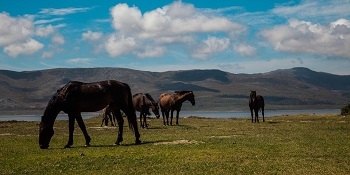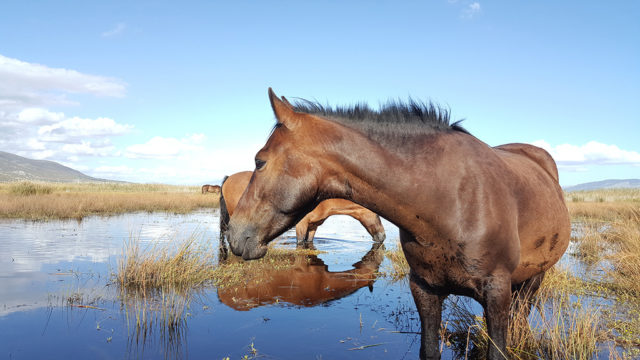History of the Wild Horses in Fisherhaven
The wild horses in Fisherhaven, near Hermanus, have a fascinating and somewhat mysterious history. Here’s an overview of their story:
The presence of wild horses in the area dates back several decades. The exact origin of these horses is uncertain and has led to various theories and speculation. One popular theory suggests that the horses are descendants of horses abandoned during the Anglo-Boer War (1899-1902) or horses released by farmers during the war to avoid confiscation by the British. Another theory proposes that the horses were introduced to the area by a landowner in the early 1900s.
Regardless of their origin, the horses have managed to survive and thrive in the wetland areas around Fisherhaven, which provide them with food and water sources. Over time, the horses have become a beloved and iconic part of the local community and have drawn attention from visitors.

The wild horses are known for their unique and hardy nature, adapted to the coastal environment. They roam freely in the marshlands, wetlands, and estuaries of the Bot River lagoon. Their population has fluctuated over the years due to natural factors such as predation, disease, and interbreeding with domestic horses in the area.
Efforts have been made to protect and manage the wild horse population. Local residents and organizations have advocated for their conservation, recognizing their cultural and ecological significance. The horses have also become a popular subject for photographers and artists, attracting visitors who are intrigued by their untamed beauty.
It’s important to note that the wild horses are considered a unique heritage feature and are protected under the Nature Conservation Ordinance of the Western Cape. Visitors are encouraged to observe the horses from a distance and respect their natural habitat.
The wild horses of Fisherhaven add to the allure and enchantment of the region, and their presence continues to be an intriguing part of the local history and natural heritage.
Residents take great pride of their Wild Horses in Fisherhaven
Fisherhaven is only 10 minutes away from Hermanus that is also well know for whale watching.
There are mainly two families of horses that roams in Fisherhaven only 10 minutes drive from Hermanus in the Western Cape. They are to be seen from the Rooisand Nature reserve close to Kleinmond up to Fisherhaven where they roam between the streets and homes of local residents. These are the only horses in South Africa known to live in the Wetlands. On hot summer days it won’t be a surprise to see them playing or relaxing in the salty waters of Fisherhaven lagoon.
These horses are unique and that they are the last descendants from the horses that was brought to South Africa during the Anglo Boer war in 1899 to 1902. During this period the British Empire shipped 360 000 horses to South Africa.

The average life expectancy of a horse was around 6 weeks
The average life expectancy of a British horse, from the time of its arrival in Port Elizabeth, was around six weeks.
The number of horses killed in the war was at the time unparalleled warfare. In the Relief of Kimberley, French’s cavalry rode up to 500 horses to their deaths in a single day. The wastage was particularly heavy among British forces for several reasons: overloading of horses with unnecessary equipment and saddlery, failure to rest and acclimatize horses after long sea voyages and, later in the war, poor management by inexperienced mounted troops and distant control by unsympathetic staff.
Horses were on occasion slaughtered for their meat. During the Siege of Kimberley and Siege of Ladysmith, horses were consumed as food once the regular sources of meat were depleted. The besieged British forces in Ladysmith also produced chevril, a Bovril-like paste, by boiling down the horse meat to a jelly paste and serving it like beef tea.
The Horse Memorial in Port Elizabeth is a tribute to the 300,000 horses that died during the conflict.

Some horses was hidden in the Kleinmond valley by the Boers to hide them from the British Soldiers. The horses in Fisherhaven could probably be the last decedents of the Anglo Boer War Horses more than a century ago.
Locals take care of the wild horses.
Communication on WhatsApp groups between the locals follow the interest and healthcare of the horses. They advise visitors to view and photograph the horses, but are urged not to touch or interact with them in order to allow them to “stay wild”.
Tags: Fisherhaven Wild Horses, Kleinmond Wild Horses, where do the Fisherhaven wild horses come from, Wild Horses in Fisherhaven
